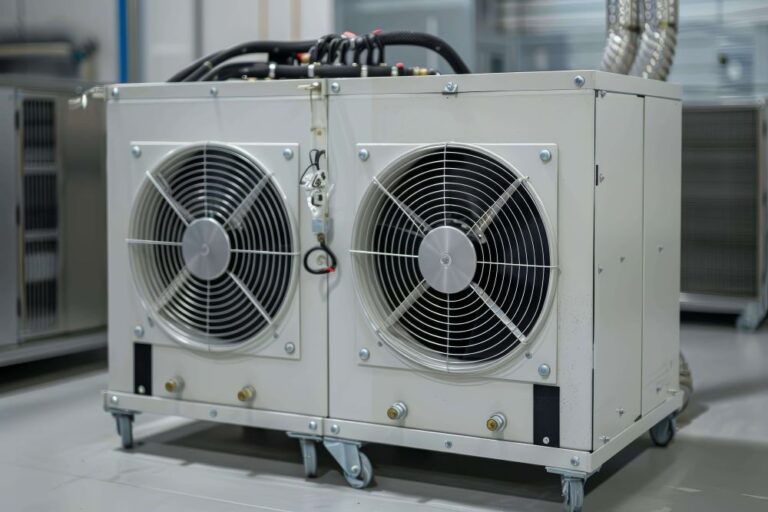Environmental control units (ECUs) are the unseen guardians of stability in environments where precision and consistency matter most. These systems regulate temperature, humidity, and air quality to create optimal conditions for both people and equipment. They prevent contamination, overheating, and moisture buildup, which can shorten equipment lifespan or disrupt critical operations.
ECUs also support consistent performance in industries that rely on tight environmental tolerances, ensuring systems remain efficient, safe, and dependable. Their role extends beyond comfort, serving as a vital safeguard for productivity, quality, and safety in modern facilities.
Read on to discover the key industrial applications of environmental control units and how they keep modern industries running smoothly and safely.
1. Defense and Aerospace Operations
Defense and aerospace environments operate under strict performance requirements where precision, reliability, and safety cannot be compromised. These industries depend on environmental control units designed to sustain critical equipment and personnel in high-stress conditions.
The following are the most vital functions ECUs perform to maintain mission readiness and operational consistency.
- Field system support: ECUs deliver precise climate control for radar systems, ground support equipment, and mobile command centers deployed in remote or unpredictable environments. They stabilize temperature and air quality to ensure uninterrupted communication, navigation, and surveillance performance. This level of environmental management allows mission-critical assets to operate at peak efficiency regardless of external conditions.
- Equipment protection: Sophisticated military and aerospace electronics require dependable environmental controls to prevent overheating and moisture damage. Advanced systems integrate a heat exchanger or active dehumidification process to maintain ideal operating temperatures within equipment housings and radar domes. Such technology extends the lifespan of sensitive instruments while reducing maintenance downtime.
- Personnel comfort: Human performance is just as critical as equipment functionality. ECUs maintain safe and comfortable working environments in military shelters and enclosed vehicles by managing temperature, humidity, and air circulation. Systems may include air conditioners or integrated humidity control mechanisms that keep conditions within safe thermostat setpoint ranges for crews working long hours in demanding operational zones.
Standard systems are often insufficient to meet the specialized needs of defense applications. Working with a company specializing in the custom design, engineering, and manufacturing of military-grade custom environmental control unit solutions ensures that each unit is tailored to withstand harsh operational demands. These engineered systems deliver the precision and durability required for defense organization missions and meet specifications such as National Stock Number standards.
2. Cleanroom Manufacturing and Electronics Production
Precision-driven industries such as semiconductor and electronics manufacturing depend on stable, contaminant-free environments. Even minor variations in temperature, humidity, or air purity can affect production outcomes, leading to costly defects or material waste. ECUs ensure these facilities operate within tightly regulated conditions to protect product integrity and maintain process efficiency.
To achieve these demanding standards, the following are the key functions ECUs provide in cleanroom and electronics production environments:
- Contamination control: Cleanrooms must maintain air free of dust, microbes, and microscopic particles that can damage or compromise delicate components. ECUs use advanced filtration systems to remove airborne contaminants, keeping air purity at the required classification level. This helps preserve the quality of semiconductor wafers, optical sensors, and microelectronic assemblies.
- Humidity and temperature regulation: Electronic materials are often sensitive to static electricity, thermal expansion, and condensation. ECUs deliver precise temperature and humidity balance to eliminate these risks, ensuring components bond correctly and circuits function as intended. Controlled conditions also minimize material stress, improving long-term reliability of finished products.
- Compliance assurance: Maintaining environmental standards is essential for regulatory compliance and quality assurance. ECUs support adherence to ISO and cleanroom classifications through continuous monitoring, automated adjustments, and consistent reporting. This ensures facilities meet inspection requirements and uphold their certification status.
With accurate and consistent environmental control, ECUs help cleanroom and electronics facilities achieve dependable production results, higher yield rates, and sustained operational excellence.
3. Healthcare and Medical Equipment Facilities
In healthcare environments, precision climate control is essential for protecting sensitive diagnostic and treatment equipment. MRI machines, CT scanners, and laboratory analyzers require highly stable temperature and humidity levels to function accurately and prevent calibration drift. ECUs deliver the consistent conditions necessary for medical technology to perform at peak reliability, ensuring that diagnostic results remain accurate and trustworthy.
Moreover, medical storage and preservation rely heavily on environmental stability. Vaccines, blood products, and biological samples can degrade quickly when exposed to temperature fluctuations or improper humidity. ECUs maintain ideal storage conditions across laboratories, pharmacies, and hospital supply rooms, extending the shelf life of critical materials and safeguarding their integrity for patient care.
Equally important, ECUs play a central role in infection control and patient safety. They regulate air pressure differentials between clean and contaminated zones, preventing airborne pathogens from spreading between rooms. As healthcare facilities continue to expand specialized areas such as isolation wards, surgical suites, and sterile processing departments, dependable ECUs ensure that these environments remain safe, compliant, and fully operational at all times.
4. Data Centers and IT Infrastructure
In large-scale IT facilities, temperature regulation is critical to keeping servers and networking hardware functioning efficiently. ECUs deliver targeted cooling to prevent overheating, ensuring that processors and storage systems operate within safe limits. This precision cooling reduces the risk of performance drops or system failures that can interrupt business operations and lead to costly downtime.
Additionally, as data centers strive to improve sustainability, ECUs contribute to energy-efficient climate management. Through smart airflow control and optimized cooling capacity, they help reduce electricity consumption without compromising performance. As a result, organizations can maintain reliable uptime while lowering operational costs and supporting long-term equipment longevity.
Final Thoughts
From precision manufacturing and defense systems to healthcare and IT facilities, environmental control units are the backbone of climate stability and operational reliability. They not only preserve equipment and product integrity but also safeguard human health and productivity. As industries continue to advance in complexity and sensitivity, ECUs will remain a cornerstone of safe, efficient, and sustainable operations.

